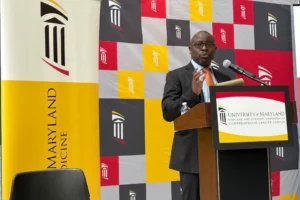Tech deal roundup: Here’s who raked in and doled out dollars in October
Published 10/30/20 in Baltimore Business Journal
Growing technology and biotech firms in Greater Baltimore are on track to raise near-record amounts of venture capital this year. The most notable recently-inked tech deals include fintech Facet Wealth’s $25 million Series B funding round and the up-to $2 billion acquisition of Johns Hopkins spinout Thrive Earlier Detection.
But there are plenty of other deals that went down this month that you may not have heard about. With this roundup, I aim to keep track of the smaller-scale funding deals, product launches and other growth moves by local companies and researchers that are contributing to the growth of the local tech ecosystem.
Check out last month’s roundup if you missed it here. And if there is any relevant news I haven’t included, or if there is anything going on in the tech sphere you’d like to tell me about, drop me a line at meichensehr@bizjournals.com.
The funded:
Five undergraduate engineering students from Johns Hopkins University (JHU), won $10,000 in funding through the 2020 Lemelson-MIT Student Prize contest for their medical device Auego. The device is designed to offer a more flexible and cost-effective option for embolization, a surgical procedure used to treat hemorrhages. Typically, the procedure uses expensive, difficult-to-use platinum coils to cut off blood flow to specific areas of the body. The Auego team’s device is made of flexible and inexpensive sponge-like material that can fit many blood vessel sizes.
University of Maryland, Baltimore County (UMBC), in partnership with the University System of Maryland, earned grant funding totaling up to $1.3 million from the the Economic Development Administration of the U.S. Department of Commerce. The funding will support Maryland New Venture Fellowship for Cybersecurity, a program aimed at supporting teams of graduate students, entrepreneurial mentors and tech experts from Maryland universities to come together and develop new cyber technologies and companies in the state.
Smiths Detection Inc., an Edgewood threat-detection technology maker, secured up to $90.8 million in a deal with the U.S. Department of Defense (DOD) to manufacture new technology, which enhances the capability of handheld military chemical detection devices, so they can also test for illicit drugs, including opioids, and detect explosive compounds. This follows on another major federal deal Smiths secured with the U.S. Department of Homeland Security earlier this year, worth up to $379 million.
A team of Johns Hopkins neurosurgeons and biomedical engineers earned $13.48 million in funding from the Defense Advanced Research Projects Agency (DARPA) to support the development of an implantable ultrasound device, which could help doctors monitor and treat blood flow changes and potential tissue death caused by traumatic spinal cord injuries. The device could benefit thousands of U.S. citizens, including military service members, who experience spinal cord injuries every year.
Researchers at the Johns Hopkins Bloomberg School of Public Health and Johns Hopkins University School of Medicine have been awarded a five-year grant worth more than $2 million per year from the National Cancer Institute of the National Institutes of Health (NIH). The money will support the immediate establishment of a special research center to study human immune responses to the coronavirus.
Four research projects in Morgan State University’s School of Computer, Mathematical and Natural Sciences received federal grant funding totaling more than $1.2 million. The objectives of the projects include progressing the science involved in quantum computing algorithms and improving encryption techniques; gathering data to enhance Morgan State’s climate and environmental tracking programs; addressing issues of racial underrepresentation in computer science through new learning initiatives; and developing alternatives to traditional chemotherapy for pancreatic cancer.
Curation Health, an Annapolis-based startup developing a platform to help streamline clinical administrative tasks, raised a Series A round of financing this month. The startup did not disclose how much funding it raised in the round, which was led by New York-based health tech investor Deerfield Management Co. and included existing investor WindRose Health Investors. Curation plans to use the funding to make some strategic hires, add features to its tech platform and grow its customer base.
The funders:
In case you missed it: Two Baltimore-area investors recently launched their own new venture funds aimed at increasing access to capital for community-focused companies and startups led by underrepresented founders. Follow the links to check out the missions and teams behind The Community Fund, co-led by Lolita Taub, chief of staff at Baltimore’s Catalyte, and RareBreed Ventures, led by McKeever “Mac” Conwell, formerly an investor with TEDCO.
RareBreed Ventures was also among the handful of minority-led investment firms to receive capital support and partnership from Alpaca VC, a seed-stage venture capital firm based in New York. Alpaca delivered six checks, collectively totaling $2.5 million, in an effort to gain “access to underserved founder networks” and help support and amplify the efforts of general partners like Conwell.
Software firm Fearless announced it is matching individual donations to certain nonprofits organizations “committed to bridging the racial gap” through the remainder of 2020 — including six in Baltimore, where the firm has its headquarters, and three in Montgomery, Alabama, where it has a satellite presence. Donors can submit a donation receipt to Fearless to get their support matched. Fearless plans to match up to $50,000 in donations in total. The Baltimore organizations tapped to receive donation matches are the Job Opportunities Task Force, Mentoring Mentors, CASA, Out for Justice, Project Pneuma and Youth Empowered Society.
Other fun things:
Technology developed by Breethe Inc., a University of Maryland, Baltimore-born startup that was recently acquired by Massachusetts’ Abiomed (NASDAQ: ABMD), has earned clearance from the U.S. Food and Drug Administration. The clearance certifies that the Abiomed Breethe OXY-1 System is safe and effective enough to be brought to market. The tech is a cardiopulmonary bypass system designed to help patients who have a severe illness that prevents their lungs from working properly.
Hunt A Killer, a Baltimore-based mystery game maker, has partnered with entertainment giant Lionsgate to create an immersive game in which players are able to become part of the storyline of the infamous Blair Witch horror film. The game includes six boxes worth of “episodes,” and was released this month, just in time for Halloween.
Balti Virtual, a city-headquartered augmented and virtual reality studio, created a new interactive exhibit featured in a Washington, D.C. office building that was previously the site of the Thaddeus Stevens School, one of the city’s first public schools built to educate Black students. The exhibit features images and stories from some of the school’s notable alumni as well as Stevens himself, who was a Pennsylvania Congressman and prominent abolitionist.



